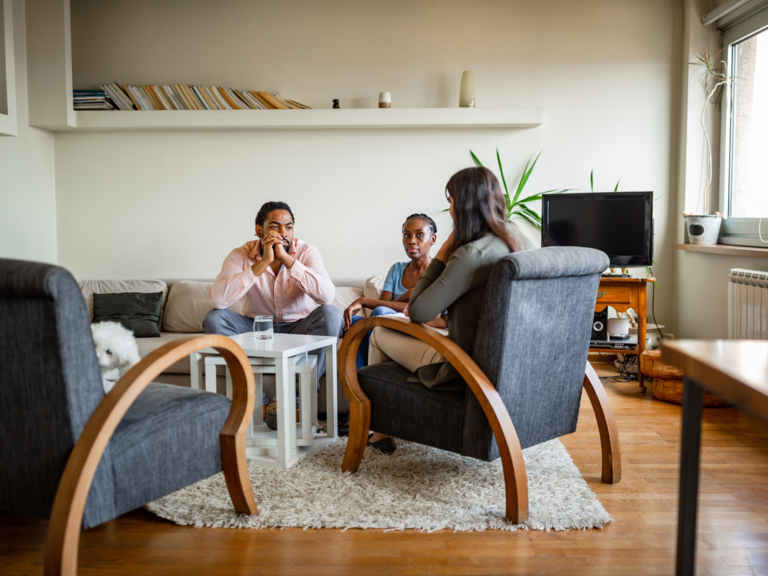Therapists Share What to Expect in Couples Therapy

For years, there was a stigma around going to any sort of therapy. The climate has dramatically shifted, and seeking therapy is openly encouraged and discussed among loved ones (and online resources make it even more accessible). As for what to expect in couples therapy, these sessions take place alongside your partner with a licensed therapist or counselor. Together, you'll come up with specific goals you want to work toward and topics you want to discuss during this intentional time with the goal of strengthening your relationship.
With insights from real couples therapists, we're outlining what to expect in couples therapy sessions, common couples therapy topics and when it makes sense to go to couples therapy.
Meet the Experts
- Lisa Brateman, LCSW, is a psychotherapist, relationship expert and author of What Are We Really Fighting About? How to Transform Conflicts into Conversations.
- Michael Mongno, MFT, PhD, LP, is a licensed psychoanalyst who specializes in holistic integrative therapy for relationships, marriages and dating.
In this article:
- What is Couples Therapy?
- Topics for Couples Therapy
- How Does Couples Therapy Work?
- When to Consider Going to Couples Therapy
- How to Prepare for Couples Therapy
- How to Find a Couples Therapist
What is Couples Therapy?
Couples therapy is a collaborative process where partners work with a trained professional to help improve communication, resolve conflicts and enhance their relationship.
"Couples therapy helps couples understand the impact their words and actions have on each other and to learn how to approach conflict in ways that are productive and respectful," explains psychotherapist Lisa Brateman, LCSW. "Turning conflicts into conversations is at the forefront of this type of therapy."
This is different from individual therapy, which involves one-on-one sessions tailored to specific individual needs. Some people choose to have both individual therapy alongside couple's therapy, or they may wish to do individual therapy first and then move on to couples therapy once they have a better understanding of themselves.
"Both individual therapy and couples therapy enable insight and new perspectives in a safe and confidential setting," Brateman says.
Topics for Couples Therapy
Various topics are discussed during couples therapy, and every couple will have a unique approach to the way they approach their sessions. Ideally, your therapist will help you identify the common sticking points in your relationship and work toward improvement. Michael Mongno, MFT, PhD, LP, a licensed psychoanalyst, says that some potential issues couples commonly work on include:
- Lack of healthy communication or emotional connection
- Religious or cultural differences
- Difficulties with sexual intimacy and desire (living as "roommates")
- Emotional or physical affairs
- Unresolved betrayal trauma
- Loss of a mutual vision for the future
- Power struggles
- Jealous or trust issues
- Unequal contributions to the household
- Differences in parenting styles
- Mid-life or existential crises
- Extended family dynamics
- Financial discrepancies/betrayals
- Addictions and behaviors
This isn't an exhaustive list, as every couple has their own unique struggles and goals. Brateman says that a common denominator, though, is that one or both people feels they're unheard or unseen. This can quickly lead to tension and disconnect, which affects the health of the relationship.
How Does Couples Therapy Work?
What to expect in couples therapy depends on what's motivating the couple to begin therapy in the first place.
"If they are in crisis, the work takes on an immediacy of triage; if they are working on more typical issues then the work unfolds developmentally via a process of discovery, personal reflection and experiencing themselves differently in front of and with each other," says Dr. Mongno. "If the couple is in a good, connected place, the work would be more strategic and preventative or healthy maintenance."
Generally speaking, though, the process begins with an initial couples therapy intake session where the therapist asks a lot of questions to get a firm grasp of what issues are most important to address. From there, you can set a cadence that's ideal for your relationship and schedule (e.g. once a week, twice a week, every other week, once monthly, etc.). Your therapist's personal approach will also affect how couples therapy looks. It's important to find a therapist you both like.
When to Consider Going to Couples Therapy
Couples therapy is beneficial when one or both parties has expressed that their needs aren't being met consistently over time and/or when you cannot reach common ground despite best efforts.
"Although it doesn't need to be a dire situation to start therapy, often couples come in when they feel helpless that the situation won't change," Brateman says. "Crisis motivates couples to seek help. Some couples start therapy when there are a few issues to address that they can't resolve by themselves."
That said, Dr. Mongno says that in his experience as a couples therapist, he often sees situations where a couple has waited too long to seek help. Once a couple's in this dire place, it can be very difficult to find their way back to each other.
He says, "When things begin to feel consistently off, a couple should begin to talk deeply and seriously about what has been happening and what is actually going on. If this becomes difficult, unproductive or reactionary, it's definitely time to seek help."
How to Prepare for Couples Therapy
The best way you can prepare for couples therapy is to come in with genuine vulnerability, a charitable view of your partner and a deep desire to improve your relationships.
"Working through a difficult time is incredibly personal, and many tend to keep it all inside. I advise each to come into the session with a willingness to honestly share what one is feeling, as well as with the desire to learn more about oneself and increase one's emotional awareness," Dr. Mongno says.
He adds that, implicit in couples therapy, is the motivation that improving the relationship takes precedence over individuality.
How to Find a Couples Therapist
In the same way not every shoe fits, not every therapist is going to feel like a harmonious match. For that reason, it's important to do some light research so you can get a good feel for the therapist's approach and specialities. Referrals from friends and online reviews can help, but speaking with the therapist often allows for the best assessment.
"Set up a short consultation with a therapist on the phone to see how it feels talking to them," advises Brateman. "It's a short window, but you will get a first impression."
After a few sessions, if you feel the therapist isn't a good fit, you can say that to the therapist and seek another person to work with. Do not be afraid of offending them; your relationship takes precedence and therapists understand that this is part of the process. And remember, it's important that both parties are on the same page and feel comfortable working with your chosen therapist.
While couples counseling isn't an overnight fix, it's been proven incredibly impactful. In fact, Dr. Mongno says that it's estimated that 70 to 90% of couples find couples therapy beneficial for their relationship.
"All that is needed is consistency, an open mind and both partners committed to healing the relationship," he says. "I explain that we were wounded in relationships, so it is only in a relationship where we have the greatest opportunity to heal."























